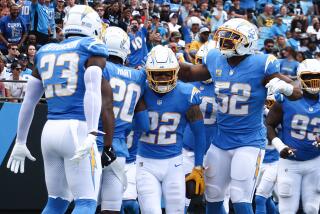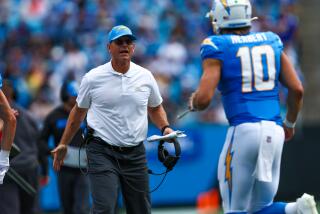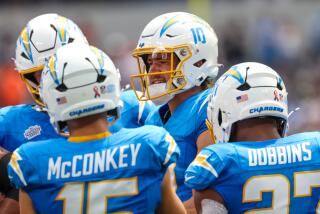RUNNING WILD
CHARLOTTE, N.C. — The runs occur with such stunning frequency that the rest of the Carolina Panthers know they’re coming without even looking.
Wide receiver Muhsin Muhammad will be roaming the secondary on a rushing play, looking for someone to block, and he’ll hear the sudden whoosh of a crowd roar coming from the stands.
Yep, it’s Tshimanga Biakabutuka.
“As soon as I hear that, I know it’s time,” Muhammad said. “I need to lock on my man--fast--and make a block, because Tshimanga’s busting another one and he’s headed my way.”
Three-plus seasons into what had been an undistinguished NFL career, Biakabutuka is suddenly making his mark, thanks to a series of spectacular runs.
Just how spectacular? He is one of only two players in NFL history to twice rush for two touchdowns of 40 yards or more in a game. The other player? Jim Brown.
Brown wound up in the Hall of Fame, of course. Biakabutuka would settle for a winning record, a playoff berth and good health.
The Panthers are 1-3 heading into today’s game in San Francisco against the 49ers, but you can’t blame Carolina’s failures on Biakabutuka.
He came into the season with just one carry longer than 29 yards, but in each of the Panthers’ two most recent games, he has scored on a pair of impressive bursts. In all four cases, Biakabutuka has broken free near the line of scrimmage and simply outraced everyone to the goal line.
On Carolina’s first play from scrimmage against Cincinnati, he took a handoff, raced around right end and went 67 yards--the longest rush in the club’s short history. Biakabutuka added a 62-yard scoring burst later in the game, leading the Panthers to a 27-3 victory.
The next week against Washington, he waited until the Panthers’ eighth play from scrimmage before racing 60 yards, this time around left end. The next time Biakabutuka touched the ball, he scored on a 1-yard plunge, and he added a 45-yard burst up the middle, powering Carolina to a 21-0 first-quarter lead. The Panthers lost 38-36, but it didn’t overshadowed the fact that Biakabutuka is doing something special every week.
“He’s pretty much in a class by himself right now,” quarterback Steve Beuerlein said. “We’d all love to see that continue, but realistically speaking, I don’t think we can expect a long touchdown run or two every week.”
The Panthers weren’t sure what to expect from Biakabutuka this year after his failure to live up to expectations in his first three NFL seasons.
The eighth overall selection in the 1996 draft, Biakabutuka began his pro career on a down note, missing training camp in a contract holdout. After he finally showed up, he played in just four games before going down with a torn ligament in his left knee, an injury that required season-ending surgery.
He spent his second and third seasons trying to get back to his old form and battling Fred Lane for playing time. Biakabutuka came into the 1999 season, the Panthers’ first under coach George Seifert, with a combined total of just 955 yards rushing as a pro.
He already has 366 yards this year, but perhaps the most astounding number associated with his fast start is that he is averaging a league-best 10.8 yards per rush.
To all of this, though, Biakabutuka shrugs.
“I just want to win,” he said. “That’s the main focus. It’s tough to be doing good but not winning games, because all the other numbers don’t really matter.”
Ten years ago, football didn’t matter to Biakabutuka for the simple reason that he didn’t know the game. A native of Kinsasha, Zaire, who moved to Montreal, Canada, at age 6, Biakabutuka grew up learning to speak four languages, playing soccer--and getting into fights.
He said there was racial tension at John Jacques Rosseau High School, so administrators decided to start a football team in hopes of channeling some of the students’ aggression.
Serge Benoit, the teacher chosen to be the team’s coach, came to Biakabutuka and asked him to play running back.
“He told me I was going to get an opportunity to hit those guys I was fighting,” Biakabutuka said. “He kind of called me a little coward and stuff like that. He attacked my pride.”
Stung by Benoit’s tactics, Biakabutuka decided to try the sport.
“I didn’t understand the concept,” he said. “I just knew it was a bunch of big guys running into each other.”
Three years later, Biakabutuka headed off to Michigan on a football scholarship, and these days, he isn’t running into many people at all, mainly because no one can seem to catch him.
He isn’t making any rash predictions about where his fast start will lead. He’s merely happy to be healthy and confident again.
Biakabutuka’s productivity has put Seifert in a difficult position. He’s torn between significantly increasing Biakabutuka’s average of 8.5 carries per game or sticking with a formula that so far has produced stunning numbers.
For now, at least, Seifert plans to gradually increase the workload.
“I’ve seen him work through some things and grow,” Seifert said. “There’s kind of an air of confidence.”
It’s one that Biakabutuka’s teammates hadn’t seen for several years.
“He’s been criticized and critiqued pretty heavily for a lot of years,” Beuerlein said. “And to see him getting some positive attention generated is very exciting for all of us who know him.”
More to Read
Go beyond the scoreboard
Get the latest on L.A.'s teams in the daily Sports Report newsletter.
You may occasionally receive promotional content from the Los Angeles Times.










